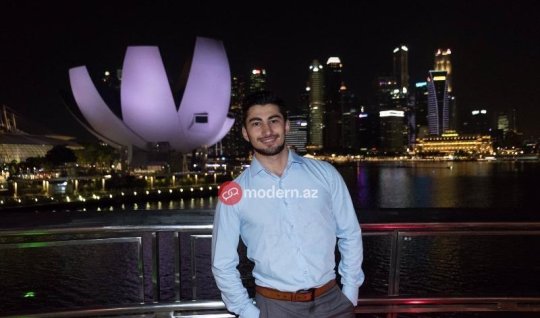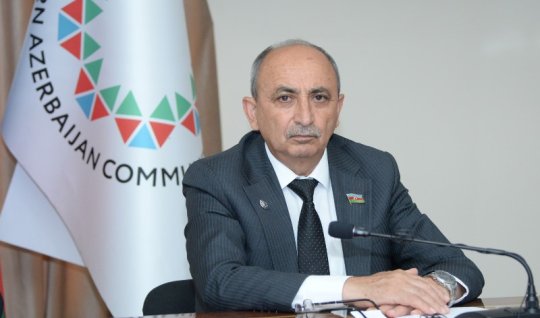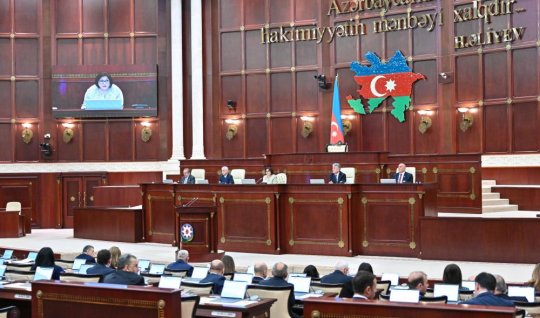Kazakhstan in Azerbaijan

Azerbaijani President Ilham Aliyev is preparing for an official state visit to Kazakhstan. During what will be the seventh visit in the last three years, the leaders of the two countries will participate in a meeting of the Supreme Interstate Council and a Kazakhstan-Azerbaijan business forum.
For information, all visits realized to date have resulted in joint projects, agreements, and organizational platforms.
At the first meeting of the Supreme Interstate Council held in Baku in March 2024, 14 documents were signed, covering a wide range of areas from education and diploma recognition to space, SMEs, and energy.
The second meeting, to be held in Astana this week, will update both the political and economic agenda.
This edition of Modern.az's “Foreign Countries in Azerbaijan” project is dedicated to Kazakhstan.
It should be noted that relations between Azerbaijan and Kazakhstan have deepened in recent years on a plane of real cooperation. These ties are forming a new economic and political order on both shores of the Caspian Sea. Multifaceted cooperation, from energy to logistics corridors, from education to culture, has transformed the two countries into key partners along the Central Asia-South Caucasus axis.
The two countries are the main operators of the Middle Corridor project. Today, relations between Kazakhstan and our country are not only political but cover almost all areas.
Currently, Kazakhstan's ambassador to Azerbaijan is Alim Bayel. The diplomat, who previously worked in Turkey, can also speak Azerbaijani.
According to unofficial data, approximately 10,000 Kazakhs live in Azerbaijan. According to the State Statistical Committee, 86,000 citizens of Kazakhstan visited Azerbaijan last year.
They mainly visited our country as tourists.

Record broken in economic cooperation
In 2024, the volume of trade turnover between the two countries amounted to 470 million dollars. In January-August 2025, it reached 547 million dollars, which is three times more than in the corresponding period of the previous year. This increase is due to the efficient use of the Middle Corridor's potential and the systematic modernization of transport and logistics infrastructure.
Azerbaijan's investment in the Kazakh economy has reached 225 million dollars, while Kazakhstan's investment in Azerbaijan has reached 136 million dollars. According to data, more than 200 enterprises of Kazakh origin have been registered in Azerbaijan. The main directions are energy, agriculture, transport, and metallurgy.
In the energy sector, the Trans-Caspian route (Aktau–Kuryk–Baku–BTC) has gained strategic importance for Kazakh oil. The transport volume, which was 1.4 million tons in 2023, reached 1.8 million in 2024, with a plan of 2.2 million tons for the next year, and a long-term target of 5–7 million tons. Kazakhstan's investment decision for the construction of a joint terminal at Alat port also increases the competitiveness of the Middle Corridor. At the same time, the construction of a 700 million dollar hot briquetted iron (HBI) plant was agreed upon for the autumn of 2025.
One of the significant projects in the infrastructure sector is the construction of underwater fiber-optic communication lines between Kazakhstan and Azerbaijan across the bottom of the Caspian Sea. The construction contract was signed in Baku in March 2025, and the completion of works is planned for the end of 2026, which will strengthen digital integration.
In the oil and gas sector, a master agreement was signed between SOCAR and the “KazMunayGas” National Company regarding the transit of 1.5 million tons of Kazakh oil per year via the Aktau-Ceyhan route.
In 2024, an agreement was signed on the gradual increase of transit volumes and the reduction of tariffs.

Education and culture line
Mutual interaction in the fields of education and culture between the two countries has become a cornerstone of “soft power” diplomacy. Azerbaijani Culture Days were held in Kazakhstan in 2024, and intergovernmental scholarship programs are expanding from 2025. The Abay Center in Baku and events dedicated to Azerbaijani language and culture in Astana are regularly held.
Kazakhstan's “Bolashak” program also increases opportunities for regional academic cooperation for young Azerbaijanis.
The International Turkic Academy, which plays an important role in conducting research and strengthening science and education ties within the Organization of Turkic States, operates successfully. Close cooperation is also carried out within TÜRKSOY, the Turkic Culture and Heritage Foundation, the Turkic States Parliamentary Assembly (TURKPA), and other international organizations.
The construction of the Kurmangazy Children's Art Center in the liberated city of Fuzuli was financed by Kazakhstan. The center has become an important cultural and educational institution, and currently, about 100 children receive education there.
How is Kazakhstan viewed from Azerbaijan?
Thus, in Azerbaijani society, Kazakhstan is perceived as the closest and most friendly country in terms of geography and relations.
Due to cultural and historical parallels between the two peoples, the proximity of languages, and a common Turkic identity, Kazakhstan is often referred to as a “brotherly country”. Public perceptions of Kazakhstan in Azerbaijan are positive.
In particular, President Kassym-Jomart Tokayev's political line, reform-oriented stance, and active participation in the Organization of Turkic States are highly valued.
Among young people, Kazakhstan has gained the image of a “modern, rapidly developing Turkic state”. Astana's urban development, the “Bolashak” program, and digitalization experience are often cited as positive examples.
In the Azerbaijani business world, Kazakhstan is largely seen as a reliable, yet still undiscovered, market. Cooperation in the energy, logistics, and agricultural sectors yields concrete results, but business circles believe that these ties have not yet reached even half of their potential.
At the political level, Kazakhstan is perceived in Azerbaijan as a secure, stable, and pragmatic partner. Among the public, Kazakhstan's neutral diplomacy and its policy of balance between Russia and the West are positively evaluated.
Viewed from Azerbaijan, Kazakhstan creates the impression of a large country. Similarities in history, religion, language, and culture have formed a natural bridge between the two countries.
Elnur Amirov
-
00:47, Bu günIsrael was reportedly holding secret meetings with this country
-
00:31, Bu günWho do the Turks consider friends? – Azerbaijan is FIRST
-
7 December 2025, 23:51Ukrainians are rapidly leaving the country
-
7 December 2025, 23:40Syrians celebrated the overthrow of Bashar al-Assad - PHOTOS
-
7 December 2025, 22:31Israel will not allow Hamas!
-
7 December 2025, 21:21Hamas announced its main condition
-
7 December 2025, 19:50Volkan Demirel resigned
-
7 December 2025, 19:33Netanyahu will not leave politics
-
7 December 2025, 18:07Netanyahu wants to meet with Trump
-
7 December 2025, 15:41Russia has attacked Ukraine - casualties reported
-
7 December 2025, 15:28A new war hotbed in the world – danger increases
-
7 December 2025, 14:50China and Russia started joint missile exercises
-
7 December 2025, 13:26The Ukrainian army liberated this territory
-
7 December 2025, 12:15Trump awarded Hollywood stars - PHOTOS
-
7 December 2025, 11:41Accusation from China: Japan interfered with military exercises
-
7 December 2025, 09:24Fire at a nightclub in India - THERE ARE FATALITIES
-
6 December 2025, 22:40We have reached an agreement with America - ZELENSKY
-
6 December 2025, 21:40Armenia and Azerbaijan border guards have removed helmets and bulletproof vests - PASHINYAN
-
6 December 2025, 20:00Ukraine no longer believes in empty promises
-
6 December 2025, 19:20“I am a 'Grey Wolf' and I will die this way! - Bağçalı
-
6 December 2025, 17:32In Russia 1 percent of men “DISAPPEARED”
-
6 December 2025, 17:13Negotiations concerning Gaza are passing through a decisive stage
-
6 December 2025, 16:51Will Putin's arrest warrant be annulled?
-
6 December 2025, 14:22Turkey–Azerbaijan energy corridor will provide incredible benefits - US Ambassador
-
6 December 2025, 13:50Horrific accident in Turkey - 6 people DIED
-
6 December 2025, 12:48Second Chernobyl?
-
6 December 2025, 09:15Ukraine's Commander-in-Chief Opposed Territorial Concession
-
6 December 2025, 08:26Students in Germany protested - “We don't want to be soldiers”
-
5 December 2025, 22:15The resolution of the Ukraine conflict is imminent...
-
5 December 2025, 19:43Assad's allies are preparing for rebellion
























































